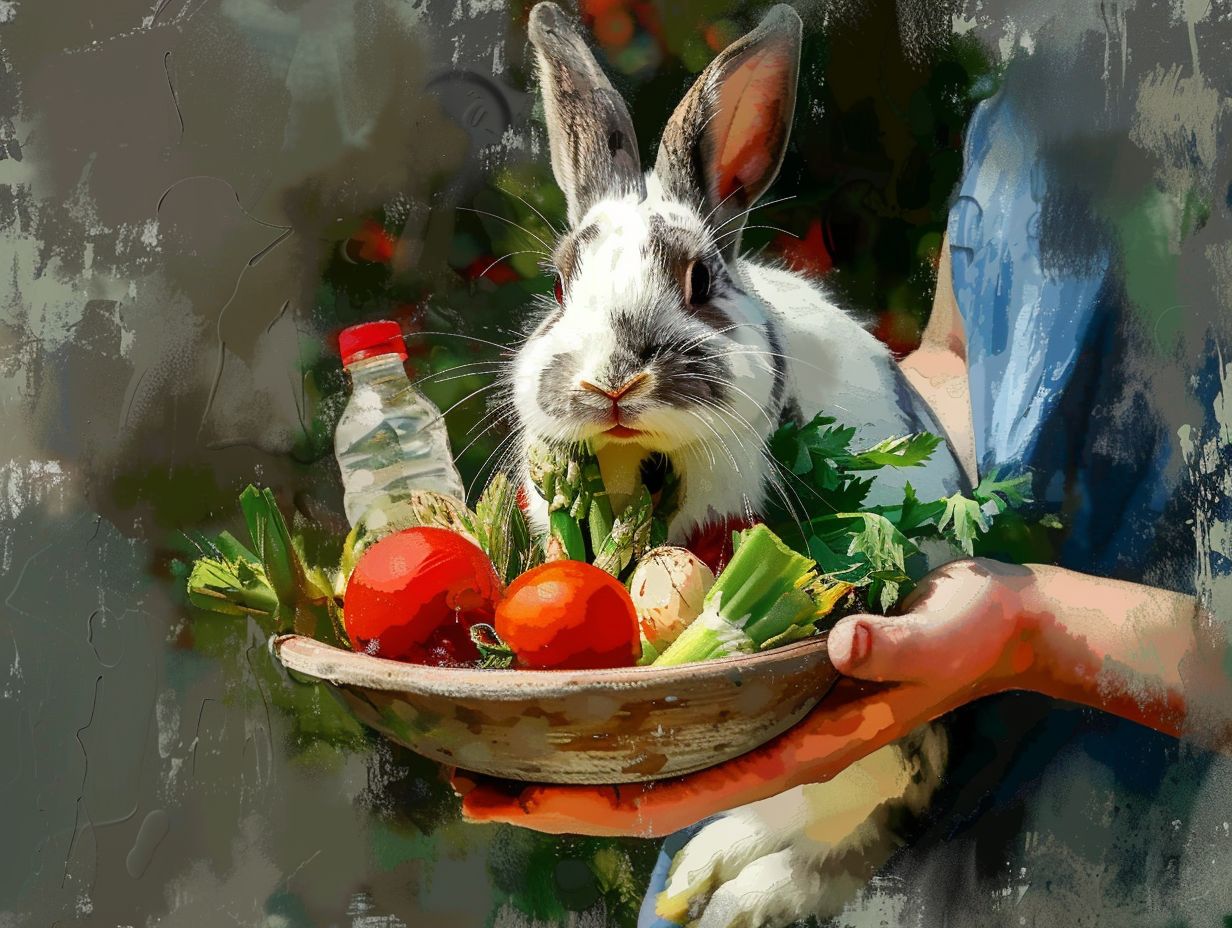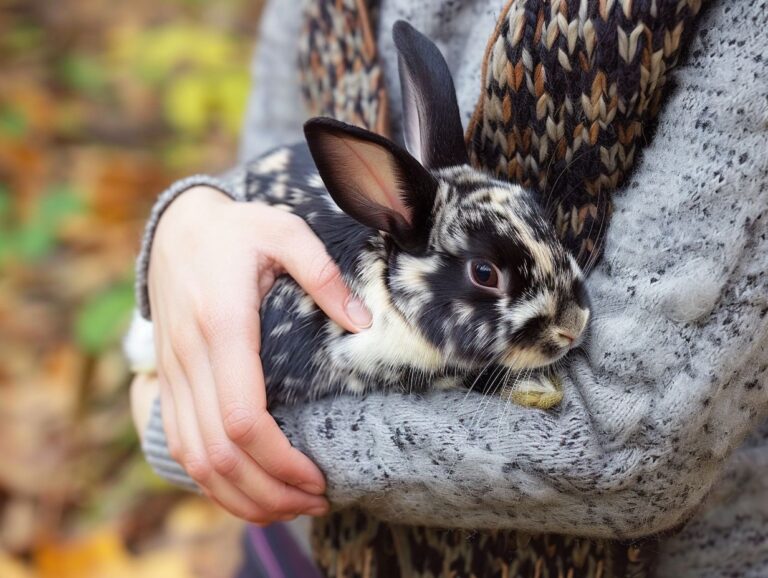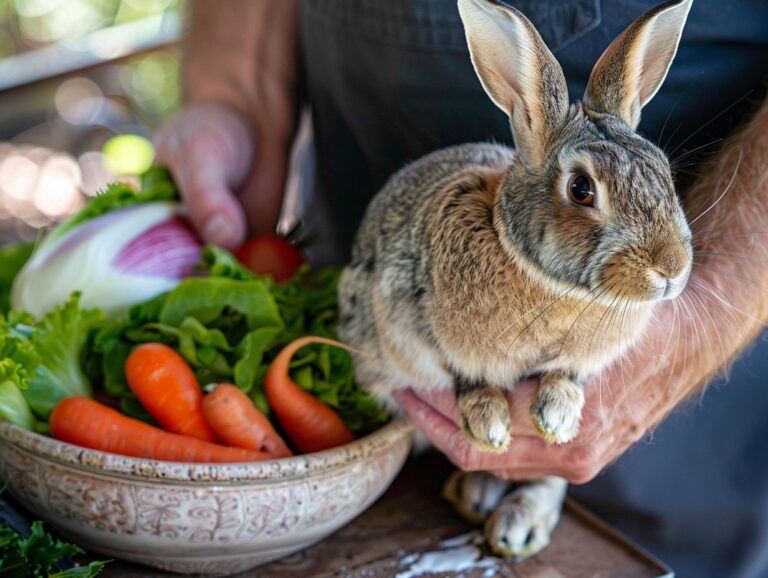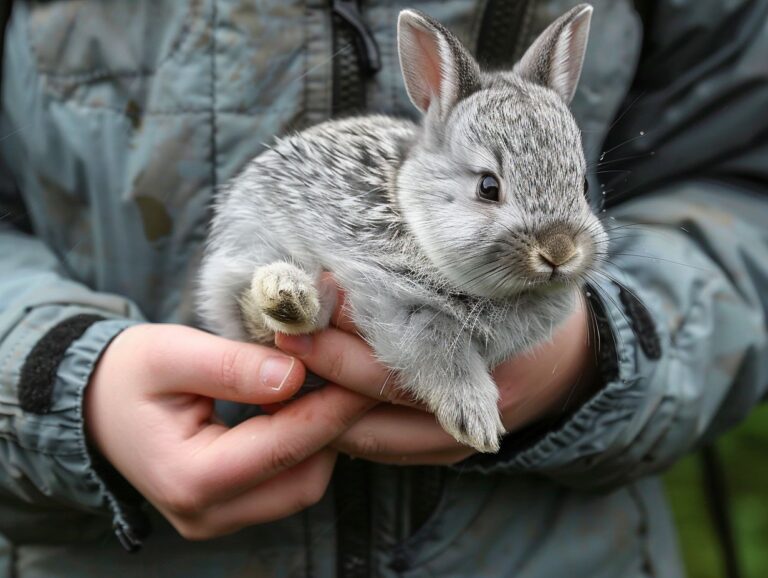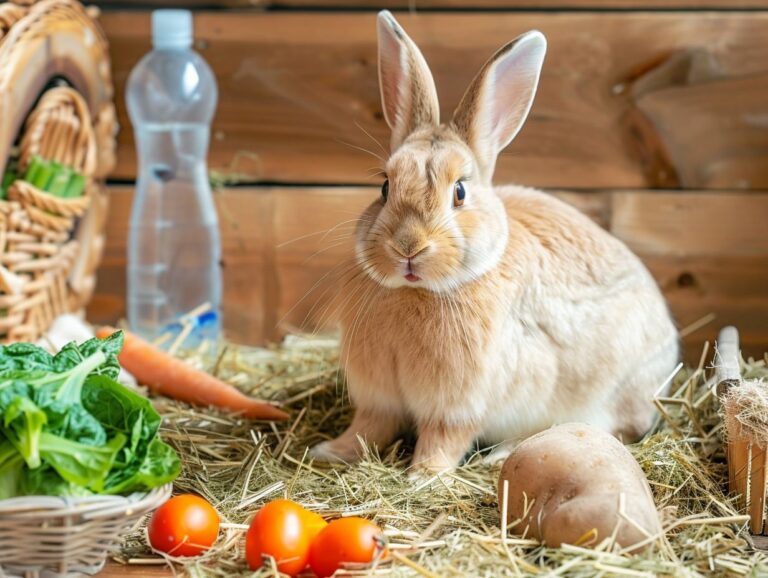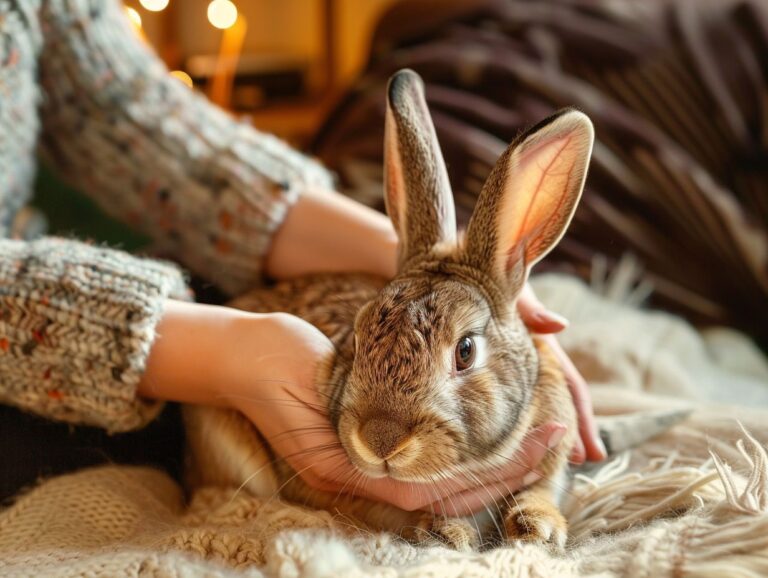Harlequin Rabbits As Pets: Care, Diet, and Health For Medium Sized Breeds
Considering getting a Harlequin rabbit as a pet? These medium-sized rabbit breeds weigh between 6 to 9 pounds and have unique characteristics that make them a popular choice among rabbit enthusiasts.
In this article, we will explore everything you need to know about caring for Harlequin rabbits, from housing and grooming to their diet and common health concerns. For more information on Harlequin rabbit breed care, explore our comprehensive guide.
Learn how to keep your Harlequin rabbit healthy and build a strong bond with your furry companion.
Key Takeaways:
What Are Harlequin Rabbits?
Harlequin rabbits are a unique breed that originated in France in the 1880s, known for their striking color patterns, distinct coat textures, and specific markings.
These rabbits were initially bred by crossing Dutch and Swiss breeds, resulting in their visually captivating appearance. The name ‘Harlequin’ was inspired by the traditional French clown, reflecting the breed’s playful and vibrant personality. If you are interested in learning more about caring for Himalayan rabbits, you can check out this guide on Himalayan rabbits as pets.
Over the years, breeders focused on refining their genetics to enhance their unique features, leading to the development of the recognized standard for Harlequin rabbits. The breed’s distinctive coat colors, such as orange, black, and blue, create a visually stunning look that sets them apart from other rabbit breeds.
What Are the Characteristics of Medium Sized Rabbit Breeds?
Medium-sized rabbit breeds exhibit a balance in size and weight, displaying a charming appearance, unique characteristics, varying temperaments, and a moderate lifespan.
These breeds typically weigh between 5 to 10 pounds and have a body length of around 14 to 20 inches. Their fur can come in a wide range of colors and patterns, from solid to spotted or agouti. Medium-sized rabbits are known for their friendly and sociable nature, making them great companions for families and individuals alike. With proper care and a healthy diet, they can live for 7 to 10 years, offering long-lasting joy to their owners.
What Are the Care Requirements for Harlequin Rabbits?
Proper care for Harlequin rabbits involves attention to their health needs, regular grooming, a balanced diet, consideration of family compatibility, training for behavioral aspects, and providing suitable housing.
Regarding health, it’s vital to keep an eye out for common issues like gastrointestinal stasis and dental problems that Harlequins are prone to. Regular veterinary check-ups and a clean living environment help prevent such issues. Grooming should include weekly brushing to avoid matting of their unique fur patterns.
Havana rabbits as pets require a diet rich in fiber from hay, fresh vegetables, and a limited amount of pellets to maintain their digestive health.
These sociable creatures thrive on human interaction but also need introductions to other pets in the family to gauge compatibility. For training, positive reinforcement works wonders; these intelligent rabbits respond well to rewards and consistency. A spacious enclosure with hiding spots, toys, and areas to hop around suits their active nature perfectly, ensuring a happy Harlequin rabbit household.
Housing and Exercise
The housing for Harlequin rabbits should provide ample space for movement and exercise, incorporating areas for play and exploration to ensure physical health and mental stimulation.
Harlequin rabbits are energetic and curious creatures that thrive in environments that cater to their natural instincts and behaviors. It is important to offer a variety of toys, tunnels, and hiding spots within their living space to keep them engaged and entertained. Additionally, proper ventilation and lighting are crucial to maintain a healthy living environment for these rabbits. Consider placing their housing in a quiet area away from excessive noise and direct sunlight to create a calming atmosphere.
Grooming
Regular grooming is essential for Harlequin rabbits to maintain a healthy coat, prevent matting, and ensure cleanliness, requiring gentle brushing and occasional baths as needed.
Brushing your Harlequin rabbit’s coat regularly is crucial to prevent tangles and remove loose fur. Use a soft brush or a grooming glove to gently work through the fur, starting from the head and moving towards the tail in the direction of hair growth.
It is important to pay attention to sensitive areas such as behind the ears and under the tail. Trimming their nails regularly is necessary to prevent overgrowth and potential discomfort. Maintaining their living space clean and dry is also essential to prevent any skin issues.
Socialization

Harlequin rabbits are social creatures by nature, thriving on interaction with their companions. Through socialization, they learn crucial skills such as communication, conflict resolution, and empathy. This process helps them develop a strong sense of trust and security within their social groups, reducing stress and anxiety. Interacting with other rabbits also fosters their cognitive abilities, enhancing problem-solving skills and overall mental acuity.
Socialization contributes to the emotional well-being of Harlequin rabbits, preventing feelings of loneliness and boredom. These rabbits display healthier behaviors and are often more adaptable to changes in their environment when they have strong social connections. In essence, socialization is not just a recreational activity for Harlequin rabbits; it is a fundamental aspect of their overall development and happiness.
What Should Harlequin Rabbits Eat?
Harlequin rabbits should follow a balanced diet consisting of fresh hay, high-quality pellets, and occasional fresh vegetables to meet their nutritional needs and promote digestive health.
Hay is a crucial component of a Harlequin rabbit’s diet, providing essential fiber that aids in digestion and helps wear down their teeth, ensuring proper dental health.
Pellets, on the other hand, should be limited to a small portion of their daily intake as they contain concentrated nutrients. Fresh vegetables, such as leafy greens and herbs, offer additional vitamins and minerals that supplement their diet. Learn more about Rhinelander rabbits as pets.
It’s important to introduce new foods gradually to prevent digestive upset, and always ensure access to clean water. Monitoring their weight and adjusting portion sizes as needed is key to maintaining their overall health and well-being.
Recommended Diet for Harlequin Rabbits
A recommended diet for Harlequin rabbits includes a variety of fresh hay, high-fiber pellets, and limited quantities of leafy greens and vegetables to support their overall health and well-being.
High-quality hay should form the bulk of a Harlequin rabbit’s diet, as it provides essential fiber necessary for digestion and dental health. Complementing this with specifically formulated pellets enriched with vitamins and minerals ensures a well-rounded nutritional profile. Incorporating a mix of leafy greens like kale, spinach, and parsley, along with vegetables such as bell peppers and carrots, offers additional nutrients and enrichment. Remember, moderation is key for treats like fruits to prevent any imbalance in their diet.
Foods to Avoid for Harlequin Rabbits
Certain foods should be avoided in the diet of Harlequin rabbits, including sugary treats, high-starch foods, and toxic plants, as they can lead to digestive issues and health complications.
Harlequin rabbits are particularly sensitive to carbohydrates and should not be fed foods like bread, pasta, or cookies which are high in sugars and starches. These items can disrupt their delicate digestive systems, causing issues such as diarrhea, bloating, and even potentially deadly conditions like gastrointestinal stasis. In addition, toxic plants such as avocado, rhubarb, and lilies can pose serious health risks to Harlequin rabbits if ingested, leading to symptoms ranging from mild stomach upset to organ failure. It is crucial for their well-being to ensure their diet consists of safe, fiber-rich foods like high-quality hay, fresh vegetables, and limited amounts of pellets to maintain optimal health and prevent digestive disorders.
What Are the Common Health Concerns for Harlequin Rabbits?
Harlequin rabbits are prone to common health issues such as respiratory problems, ear mites infestations, and certain diseases that require prompt veterinary care and preventive measures.
Respiratory issues in Harlequin rabbits can be triggered by various factors like poor ventilation, dusty bedding, or exposure to drafts. Symptoms may include sneezing, nasal discharge, and labored breathing, indicating a potential respiratory infection.
Care for small rabbit breeds is crucial for their health and well-being.
On the other hand, ear mite infestations are another prevalent concern among Harlequins, leading to discomfort, head shaking, and ear scratching. Regular check-ups by a vet can help detect and treat these problems early to prevent further complications.
Gastrointestinal Stasis
Gastrointestinal stasis is a common health issue in Harlequin rabbits, characterized by a slowdown in gut motility that can lead to serious digestive complications and discomfort.
Common symptoms of gastrointestinal stasis in Harlequin rabbits include reduced or absent fecal output, lack of appetite, bloating, and lethargy. To manage this condition effectively, it is crucial to seek immediate veterinary care. Treatment often involves fluid therapy, pain management, syringe feeding, and medications to stimulate gut motility.
Preventive measures play a crucial role in addressing gastrointestinal stasis. Providing a diet high in fiber, regular exercise, proper hydration, and a stress-free environment can reduce the risk of this condition. Owners must also monitor their rabbits closely for any signs of digestive issues and promptly address them to prevent complications.
Dental Problems

These issues often arise due to the unique dental structure of Harlequin rabbits, where teeth continuously grow throughout their life. Without sufficient wear from their diet, the teeth can become too long, leading to sharp points or trauma within the mouth.
As a result, rabbits may exhibit signs like drooling, reduced appetite, weight loss, and in severe cases, abscesses or health issues or even complete refusal to eat.
To address these concerns, providing a diet rich in hay and fibrous vegetables is crucial to promote natural wearing of the teeth. Regular veterinary check-ups are also essential to detect dental problems early, enabling prompt intervention such as filing down overgrown teeth or surgical correction for malocclusion.
Ear Mites
Ear mites infestations are a common health concern for Harlequin rabbits, leading to itching, irritation, and potential ear infections that require prompt treatment and preventive measures.
When a Harlequin rabbit is infested with ear mites, you may notice symptoms such as frequent scratching at the ears, head shaking, and crusted debris inside the ear canal. If left untreated, these pesky parasites can lead to secondary infections that may cause pain and discomfort for your furry friend.
Proper treatment involves thorough cleaning of the ears with a veterinarian-prescribed solution and the administration of appropriate medication to eradicate the mites effectively. For American Sable rabbits as pets, it’s crucial to follow these guidelines.
Prevention plays a crucial role in managing ear mite infestations in Harlequin rabbits. Regularly inspecting your rabbit’s ears, maintaining good hygiene by keeping their living environment clean, and scheduling routine veterinary check-ups can help in early detection and management of ear mites.
How to Keep Your Harlequin Rabbit Healthy?
Maintaining the health of your Harlequin rabbit involves scheduling regular vet check-ups, practicing proper hygiene and cleanliness, and providing a balanced diet to support their overall well-being and longevity.
Regarding veterinary care, make sure to find a rabbit-savvy veterinarian who understands the unique needs of Harlequin rabbits. Regular check-ups are vital to detect any health issues early. Keeping their living environment clean is essential to prevent diseases. Ensure their cage or enclosure is sanitized regularly, and their bedding is clean and dry.
Hygiene practices also extend to handling your rabbit; wash your hands before and after interacting with them to prevent the spread of bacteria. As for their diet, provide a variety of fresh hay, vegetables, and limited fruits to ensure they receive the necessary nutrients for their well-being.
Regular Vet Check-ups
Regular veterinary check-ups are essential for Harlequin rabbits to monitor their health status, address common health problems, and receive timely interventions for any emerging issues.
During these examinations, the veterinarian will conduct a thorough physical assessment, checking for any signs of illness or issues such as overgrown teeth, parasites, or respiratory infections. They may recommend:
- preventive measures such as vaccinations, deworming, or dental care
- screenings for common rabbit diseases like E. cuniculi or pasteurellosis
- early detection and treatment of conditions like gastrointestinal stasis or dental malocclusion can significantly improve the rabbit’s quality of life.
Regular check-ups play a crucial role in ensuring the well-being and longevity of your beloved Harlequin rabbit.
Proper Hygiene and Cleanliness
Maintaining proper hygiene and cleanliness for your Harlequin rabbit involves regular grooming, cage cleaning, and sanitation practices to prevent infections, parasites, and ensure a healthy living environment.
Regular grooming sessions are essential to keep your Harlequin rabbit’s fur in optimal condition. Brushing their coat gently helps prevent matting, removes loose fur, and reduces the chances of hairballs. It also provides a bonding opportunity between you and your fluffy companion.
Cage cleaning should be a routine task to maintain a fresh and hygienic living space for your pet. Remove any bedding that is soiled, wipe down surfaces with a pet-friendly disinfectant, and ensure proper ventilation to prevent odors and bacteria buildup. For more details on caring for Rex rabbits as pets, check out this comprehensive guide on rex rabbits care.
Sanitation practices, such as washing food and water dishes, cleaning litter boxes, and keeping the surroundings free from any potential hazards, play a crucial role in promoting the overall health and well-being of your Harlequin rabbit.
Providing a Balanced Diet
Ensuring a balanced diet for your Harlequin rabbit involves offering a variety of fresh hay, high-quality pellets, and appropriate vegetables to meet their nutritional requirements and support their digestive health.
It is essential to provide your Harlequin rabbit with a consistent source of fresh, clean water to ensure proper hydration and digestion.
Portion control plays a crucial role in preventing obesity and maintaining a healthy body weight for your rabbit.
Incorporating a small amount of fruit into their diet can provide essential vitamins and minerals, but it should be given as an occasional treat due to its higher sugar content.
- Regularly monitoring your rabbit’s weight and adjusting their food portions accordingly can help prevent health issues related to overeating.
- Consulting with a veterinarian or a rabbit specialist can provide insights into specific dietary needs and recommendations for your Harlequin rabbit.
What Are Some Tips for Bonding with Your Harlequin Rabbit?

When socializing with your Harlequin rabbit, it’s essential to approach them calmly and gently, as these rabbits are known for their sensitive nature.
Creating a routine that includes daily interactions such as petting, grooming, and playtime can help strengthen your bond. Observe their body language to understand their preferences and boundaries, respecting their space when needed. For more information on caring for medium-sized breeds like Satin Angora rabbits as pets, check out this comprehensive guide.
Providing a safe and enriching environment with toys, hiding spots, and proper nutrition will contribute to the overall well-being and happiness of small breed rabbits.
Frequently Asked Questions
What is the average size of a Harlequin rabbit and is it considered a medium-sized breed?
The average size of a Harlequin rabbit is between 6 to 9 pounds, which falls under the category of medium-sized breeds.
What is the recommended diet for a Harlequin rabbit as a pet?
A Harlequin rabbit’s diet should consist of high-quality hay, fresh vegetables, and a small amount of pellets. It is important to also provide them with fresh water at all times.
How often should I groom my Harlequin rabbit and what are some recommended grooming techniques?
It is recommended to groom a Harlequin rabbit at least once a week to remove any loose fur and prevent hairballs. Grooming techniques include brushing with a soft bristle brush and trimming their nails every few weeks.
What are some common health issues that Harlequin rabbits may face and how can I prevent them?
Some common health issues for Harlequin rabbits include dental problems, digestive issues, and respiratory infections. To prevent these, it is important to provide a healthy diet, regular exercise, and keep their living environment clean.
How much exercise does a Harlequin rabbit need on a daily basis?
Harlequin rabbits are active and energetic animals, so it is recommended to provide them with at least 3-4 hours of exercise and playtime outside of their cage every day. This can include supervised free-roaming or interactive toys.
Are Harlequin rabbits good pets for families with children?
Yes, Harlequin rabbits can make great pets for families with children. However, it is important to supervise interactions between the children and the rabbit to ensure the safety and well-being of both. It is also important to teach children how to properly handle and care for rabbits.

